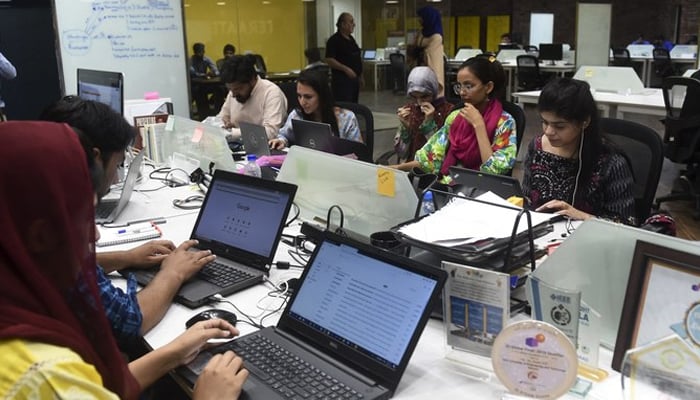Women in STEM
In their latest research, Gallup Pakistan and PRIDE conclude that only 28 per cent of women engineers in Pakistan are employed. The survey is based on data from the Labour Force Survey 2020-21 and has found that 20.9 per cent of a total of 28,920 women engineering graduates were unemployed, and close to 50.9 per cent were out of the labour force. The research also highlights that 64 per cent of those graduates who opted to remain out of the labour force were married. Engineering had long been considered a men-only field with a shockingly low number of women. Over the years, many girls showed an interest in science and technology and entered the field. But the market is not designed in a way to accommodate women employees who still have to fight their battles to get some space in an increasingly male-dominated work environment.
From long work hours to unsanitary conditions at workplaces, women have to deal with a lot of issues that eventually push them out of the labour force. In our society, an unchallenged belief is that women do not want to work and that they choose to stay at home instead of finding a good job. But the entire structure is so ridiculously anti-women that all that is left for them is to either look for home-based work opportunities or abandon their dreams of having a long, fulfilling career. And this is something that requires the government’s undivided attention. On the Global Gender Gap Index 2023, Pakistan ranks 142 out of 146 countries. Less than 5.0 per cent of professionals in senior positions in the country are women and when they take to the streets or use social media platforms to voice their concerns, they are called troublemakers.
Managerial positions in most sectors are filled with men, who often have no understanding of the restrictions this society imposes on women. In engineering, where women will have to do fieldwork, this means making arrangements for women and being mindful of their needs. No is ready to do the extra work. Even though the government allows women to take maternity leave, most private organizations give such leaves without pay, forcing women to rejoin a few weeks after giving birth. Lack of daycare at organizations and cultural roles attached to women also push them away from being an integral part of the job market. In a country where crimes against women are rampant, the genuine demands of women regarding commuting facilities is seen as financially unprofitable for most employers who deliberately prefer male candidates over women. Women around the world are leading businesses and heading scientific discoveries. Pakistan has a lot of potential and talent to join the race of technological advancements and the world of innovation. It now rests with the government to give the attention the matter deserves and make women feel welcome in the labour force.
-
 Lana Del Rey Announces New Single Co-written With Husband Jeremy Dufrene
Lana Del Rey Announces New Single Co-written With Husband Jeremy Dufrene -
 Ukraine-Russia Talks Heat Up As Zelenskyy Warns Of US Pressure Before Elections
Ukraine-Russia Talks Heat Up As Zelenskyy Warns Of US Pressure Before Elections -
 Lil Nas X Spotted Buying Used Refrigerator After Backlash Over Nude Public Meltdown
Lil Nas X Spotted Buying Used Refrigerator After Backlash Over Nude Public Meltdown -
 Caleb McLaughlin Shares His Resume For This Major Role
Caleb McLaughlin Shares His Resume For This Major Role -
 King Charles Carries With ‘dignity’ As Andrew Lets Down
King Charles Carries With ‘dignity’ As Andrew Lets Down -
 Brooklyn Beckham Covers Up More Tattoos Linked To His Family Amid Rift
Brooklyn Beckham Covers Up More Tattoos Linked To His Family Amid Rift -
 Shamed Andrew Agreed To ‘go Quietly’ If King Protects Daughters
Shamed Andrew Agreed To ‘go Quietly’ If King Protects Daughters -
 Candace Cameron Bure Says She’s Supporting Lori Loughlin After Separation From Mossimo Giannulli
Candace Cameron Bure Says She’s Supporting Lori Loughlin After Separation From Mossimo Giannulli -
 Princess Beatrice, Eugenie Are ‘not Innocent’ In Epstein Drama
Princess Beatrice, Eugenie Are ‘not Innocent’ In Epstein Drama -
 Reese Witherspoon Goes 'boss' Mode On 'Legally Blonde' Prequel
Reese Witherspoon Goes 'boss' Mode On 'Legally Blonde' Prequel -
 Chris Hemsworth And Elsa Pataky Open Up About Raising Their Three Children In Australia
Chris Hemsworth And Elsa Pataky Open Up About Raising Their Three Children In Australia -
 Record Set Straight On King Charles’ Reason For Financially Supporting Andrew And Not Harry
Record Set Straight On King Charles’ Reason For Financially Supporting Andrew And Not Harry -
 Michael Douglas Breaks Silence On Jack Nicholson's Constant Teasing
Michael Douglas Breaks Silence On Jack Nicholson's Constant Teasing -
 How Prince Edward Was ‘bullied’ By Brother Andrew Mountbatten Windsor
How Prince Edward Was ‘bullied’ By Brother Andrew Mountbatten Windsor -
 'Kryptonite' Singer Brad Arnold Loses Battle With Cancer
'Kryptonite' Singer Brad Arnold Loses Battle With Cancer -
 Gabourey Sidibe Gets Candid About Balancing Motherhood And Career
Gabourey Sidibe Gets Candid About Balancing Motherhood And Career




